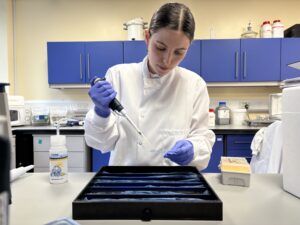Current funded projects
A new PhD research project exploring the early stages of migraine attacks
Understanding the biology behind migraine premonitory symptoms
Overview
With support from The Migraine Trust, a new four-year iCASE PhD research project launched in October 2024 at King’s College London.
The project will explore the neurobiology of premonitory symptoms — the early, non-painful signs of an impending migraine attack — with the goal of uncovering new ideas for therapies that could act to normalise the migraine attack before the headache phase begins.
This research represents a major step toward redefining how migraine is treated, recognising it as a complex neurological disorder that is much more than a headache.
Why this research matters
Migraine is a highly disabling condition that significantly impacts quality of life. While traditional therapies focus on managing pain after a migraine begins, many people with migraine experience early warning symptoms — such as:
- Fatigue or low energy
- Sensitivity to light and sound
- Food cravings or unusual thirst
These symptoms may appear hours or even days before the headache begins. Understanding them could be key to intervening earlier and reducing these bothersome symptoms or even in an attempt to stop these attacks at the earliest opportunity.
The research focus
This PhD project is investigating how the brain changes in the premonitory phase of a migraine. Scientists at King’s College London have already discovered abnormal activity in the hypothalamus — a deep-brain region responsible for regulating the body’s internal balance (homeostasis) — during this early stage.
By targeting the earliest non-pain symptoms reported by patients, we hope to uncover the important first steps in attack initiation
The goal is to uncover mechanisms within the brain that can be targeted with new treatments before the pain even begins — potentially transforming migraine care.
Meet the Researcher: Mignon Van der Watt
This project will be led by Mignon Van der Watt, who joined King’s College London as a MRC-DTP iCASE PhD student in October 2024.
Having The Migraine Trust and the migraine community collaborating with us on this project will play an invaluable role in designing research informed by lived experience
Mignon brings a strong academic background in biochemistry, neuroscience, and molecular biology, with a deep interest in translational research that bridges patient experience with lab science.
Our role in the project
At The Migraine Trust, we are proud to fund this research as part of our commitment to supporting early-career scientists and investing in cutting-edge science that is shaped by people living with migraine.
We’re delighted to collaborate with King’s College London on this project. Supporting brilliant young scientists is central to our mission.



